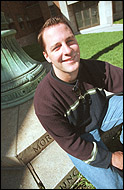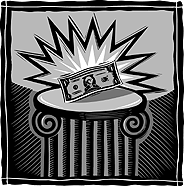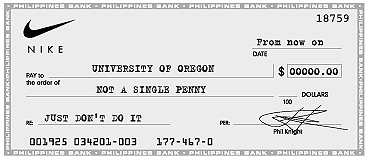kaleidoscope
Matthieu Darche: He scores

Matthieu Darche PHOTO: Owen Egan | |
These are heady days for Matthieu Darche.
It's exciting enough to be graduating in a few short weeks with a bachelor's degree in management, which Darche will be doing. But convocation is probably the last thing on his mind right now.
The Redmen left wing, who led all Canadian university hockey players in scoring this year, is a finalist for the Howard Mackie award as Canada's male university athlete of the year. (For the first time ever, McGill has a finalist for both the men's and women's Mackie prize -- McGill runner Sarah Ali-Khan is up for female athlete of the year).
To top it off, Darche just agreed to a contract to become one of the first members of the Columbus Blue Jackets, a new NHL franchise gearing up for its initial season later in the fall.
When Darche began the season, he was hoping he might slip onto the radar screen of a pro scout who might offer him an NHL tryout. As the season wore on and as Darche led the Redmen to one of their best years ever, more and more NHL scouts started turning up in the stands at the McConnell Arena to see Darche in action.
Then NHL general managers like the Montreal Canadiens' Rejean Houle began dropping by to see the college player their scouts raved about. By the end of the year, eight teams tried to entice Darche to sign with them.
"I tried to do it myself at first, but I was in way over my head," Darche says of the process of negotiating with teams. He found some of their representatives to be kind of slippery to deal with.
He turned to Don Meehan. Meehan is one of the most powerful player representatives around. Darche worried he wouldn't rank high as one of Meehan's priorities.
"At first, I thought this guy represents stars like Curtis Joseph and Al MacInnis. He is not going to have any time for me."
But Meehan, a McGill law graduate, surprised Darche with the attention he gave the McGill player.
"I'm the first McGill graduate he has represented," Darche says smiling. "He was psyched."
The three teams that wooed Darche the most persistently were the Montreal Canadiens, the St. Louis Blues and Columbus. St. Louis offered the most money, but the team already has a solid lineup, finishing first overall in the regular season. Darche suspected he would have a much easier time cracking the roster of a brand new club like Columbus.
Darche also decided against the Canadiens, whose players have to put up with having their every move analyzed by the city's hyper-critical sports media in this hockey-mad town. "My mother wanted me to sign with Montreal. I told her, 'Mom, you wouldn't be able to take what they'd say about me in the newspapers."
Darche isn't just a sniper, he is valued for his defensive abilities too. And while he is no fighter, Darche is a big guy who doesn't mind banging into people. He says he would like to model himself after Philadelphia Flyers John LeClair and Keith Primeau -- big men who play an aggressive game without taking boneheaded penalties. The two are also accomplished players both offensively and defensively.
Darche knows the odds are against him. Precious few Canadian university hockey players establish themselves in the NHL. Of the hundreds of NHL players, only two, Anaheim centre Steve Rucchin and Toronto defenceman Cory Cross, played in the Canadian university circuit.
"[Columbus general manager] Doug MacLean told me I have a real shot at making the team at training camp. That's all I want," says Darche.
"My goal is to be playing in the NHL in the fall. I'm not cocky about it, but I'm confident about my chances."
Darche was recently given advice by Canadiens player Trent McCleary. "He told me a lot of guys are just happy to make it to an NHL training camp. They play one shift with a star like Saku Koivu and they're satisfied. They see a veteran like Shayne Corson and they're in awe when they should be battling with him in the corners for the puck."
Darche says he plans to make himself noticed.
As for choosing the unconventional route of university hockey, Darche says he made the right move.
"Hockey isn't forever. You look at all the guys in the junior hockey leagues who aren't going to university. Maybe one percent of them make it to the NHL. Even if you make it, it might only be for a couple of years. It doesn't make sense to put all your eggs in one basket."
Darche says he enjoyed his marketing and advertising courses the most at McGill and he has worked summers doing promotional work for auto-racing. If the NHL doesn't pan out, he sees himself in sports marketing.
 |
||||
|
Of course I get some husbands who call me up and thank me. |
||||
Scholars for dollars

| |
The Mike Harris government in Ontario has given the green light to the establishment of for-profit, private universities in the province, a move that has the Ontario Confederation of University Faculty Associations (OCUFA) seeing red.
In announcing her government's decision, Ontario Minister of Training, Colleges and Universities Dianne Cunningham said, "This transformation will give students more opportunities for a top-quality education and ensure the postsecondary system will provide them with innovative and flexible choices."
The Globe and Mail has endorsed the move. "If private universities can generate enough distinctive academic value to prosper economically, most public institutions will improve in reaction."
But Deborah Flynn, president of the OCUFA, says private universities have plenty of drawbacks. "The Harris government is advocating private universities as a cost-free, quick-fix solution to the chaos its own policy of underfunding has created in the university sector."
Flynn says an OCUFA study of private universities indicates that, in the U.S., they "derive an estimated 30 per cent of their income from either direct or indirect public subsidies." Flynn says the study pokes a hole in Harris's assertion that for-profit universities won't cost taxpayers a dime. The OCUFA study also indicates that student loan default rates are much higher at private vocational schools than they are at publicly funded universities.
 |
||||
|
People have died as a consequence of the Peter Duesbergs of this world. If we could succeed and lock a couple of these guys up, I guarantee you the HIV-denier movement would die pretty darn quickly. |
||||
Just won't do it

ILLUSTRATION: TZIGANE
Nike CEO Phil Knight has been very generous to the University of Oregon, his alma mater, over the years. Knight has donated $50 million to the school. But the running shoe magnate pledges he won't give the university so much as a dime from here on in.
"The bonds of trust, which allowed me to give at a high level, have been shredded," he recently declared.
Before barring the university from the contents of his wallet, Knight was thought to be on the verge of making a hefty donation for the renovation of the university's football stadium. He changed his mind when the university joined the Workers Rights Consortium, a watchdog group backed by students and organized labour that monitors working conditions in overseas factories used by Nike and other apparel-makers.
Knight says he's tired of Nike being demonized for its treatment of garment workers in developing countries. He says Nike has made mistakes in the past, but has improved its practices -- raising wages for Indonesian footwear workers by more than 70 per cent, for instance. He adds that Nike's conduct is the subject of constant monitoring by PricewaterhouseCoopers and the results of the independent firm's investigations will be posted on Nike's web site, "warts and all."
Knight criticizes the WRC for not letting companies participate in how it sets its standards and monitoring. And he says the group, backed by unions, is not without its own biases. "Their main aim, logically and understandably, however misguided, is to bring apparel jobs back to the U.S."
Students interviewed by The Oregonian generally backed the U of O's decision. "I don't think we should have signed on with the [WRC]. But we voted as a student body to do that. Phil Knight pulling his money in direct correlation to the university signing is childish," said U of O senior Christy Boyles.
Source: The Oregonian

